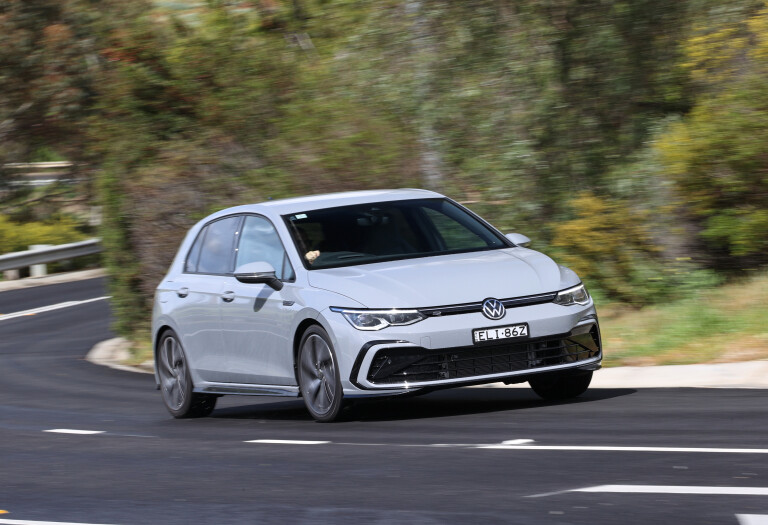
Score breakdown
Things we like
- Looks great
- Ride comfort and handling
- Smoother auto transmission
- Cabin fit, features and finish
Not so much
- Fiddly touchpad controls
- No R-Line six-speed manual option
- Tyre noise
- Questionable value over the Life
Priced at $37,450 before on-road costs, the Volkswagen Golf R-Line is the most expensive Golf variant before graduating to the considerably more costly GTI and R hot hatches.
The Volkswagen Golf R-Line is a sheep in wolf’s clothing that comes with much of the Golf R hot-hatch’s styling features but lacks its stonking 235kW 2.0-litre engine, instead coming with the 110kW 1.4-litre turbo-petrol also found under the bonnet of the eponymous entry-level Golf and Golf Life variants.
So what does it bring to the table to make you spend more over the regular Golf and Golf Life variants that provide the same level of engine performance?
What is the Volkswagen Golf-R like to live with?
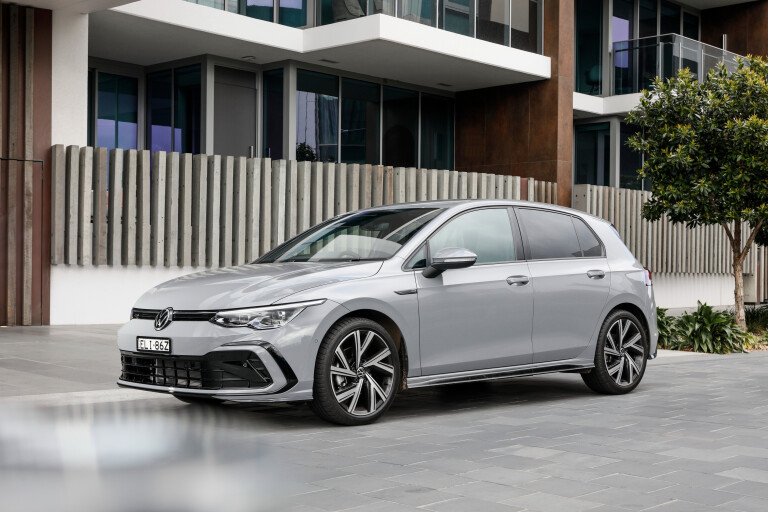
Volkswagen’s designers have a talent for making a conservative exterior design look very attractive, case in point the Golf Mark 8.
Creases along the bodywork are kept to a minimum, with a neat straight swage line running along most of the body and a corresponding contour along the door sill.
Up front, there’s a nice big sculpted bonnet that curves down to the slimline grille and sleek headlights that sit above the sports bumper and huge black diffuser, flanked by LED foglights and slimline scoops.
Priced at $37,450 + ORC, this is the most expensive Golf variant before graduating to the considerably more costly GTi and R.
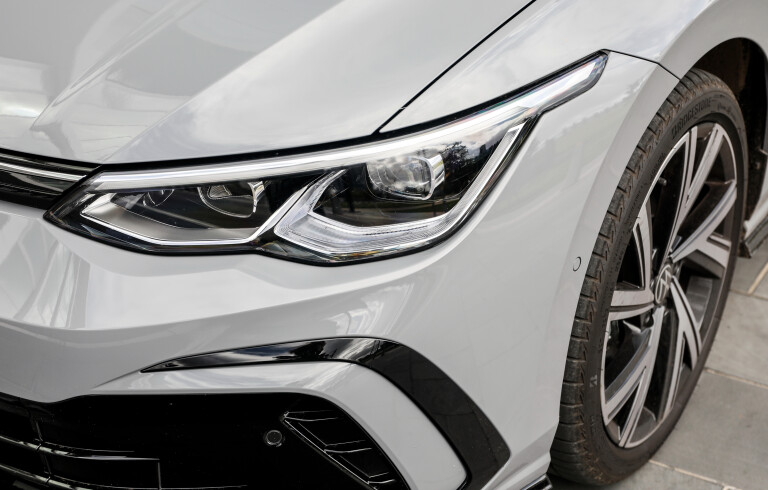
This less-is-more treatment has also been handed to the rear end, with a sleek-looking indentation that that flows from the rear bumper up the tailgate.
The R-Line variant stands out from its siblings with a sportier front bumper, chrome highlights along the grille flanked by ‘performance headlights’, plus twin exhaust tips and piano black trim on the bumpers and side skirts.
It also comes with two-tone 18-inch rims, bigger than the 16s and 17s on the Golf and Golf Life respectively. And the suspension has been lowered by 15mm, which gives it a more athletic stance.
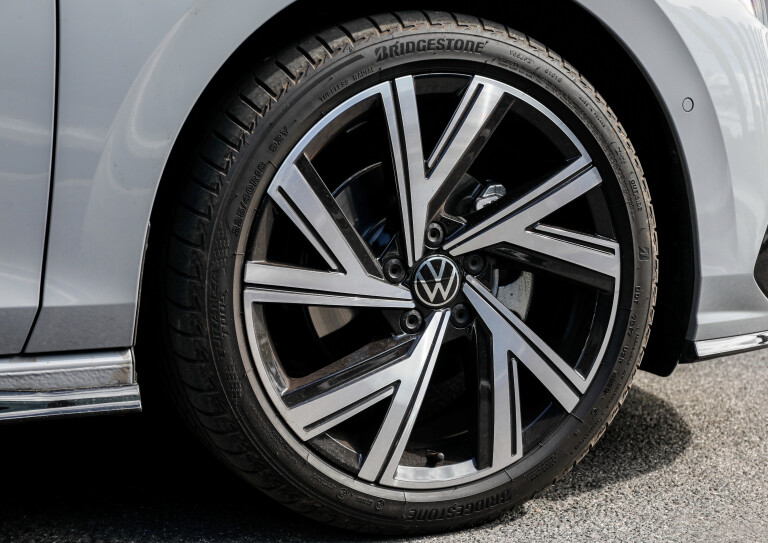
Inside, the R-Line comes with monogrammed ‘R’ grey cloth and microfleece front sports seats with good side bolstering and a distinctive pattern that reminds me of the Golf GTI's plaid trim. The seats are manually adjusted but there is an infinity dial so you can get the backrest exactly where you want it.
It otherwise shares many of the features found in the mid-spec Life, which costs $3200 less. These include a 10.25-inch digital ‘cockpit pro’ gauge cluster, 10.0-inch ‘Innovision cockpit’ infotainment system, wireless smartphone mirroring and charging, in-built satellite navigation, tri-zone climate control and keyless entry/start.
Our test vehicle also comes with a Sound and Vision package that for $1500 brings a head-up display and 480-watt Harmon Kardon premium audio with eight speakers, subwoofer and amplifier.
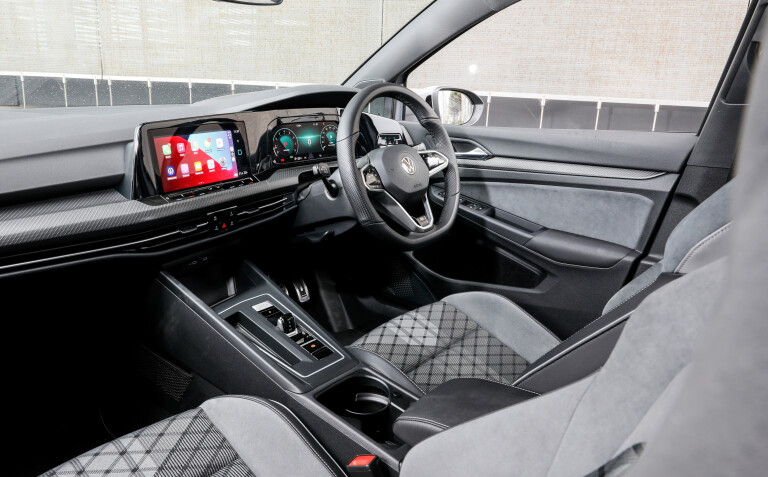
The most obvious change inside the Golf 8 is the lack of physical buttons and switches. Apart from the traditional start button and window switches, almost everything is controlled on the screen including most of the tri-zone climate control functions.
This can be a pain when you’re on the move, though Volkswagen has added a ‘smart’ climate control menu that offers one-touch commands to add demist, warm your feet or hands, or send cool air through the front vents.
You can also adjust the audio volume and cabin temperature using the touchpads that are quite sensitive, as are the buttons to the right of the steering wheel themselves that control the exterior lights and window demisters.
Touchpads on the steering wheels have a haptic feel that makes them easier to operate while driving, though I do prefer physical buttons and switches but thankfully the light and windscreen wiper stalks have been retained.
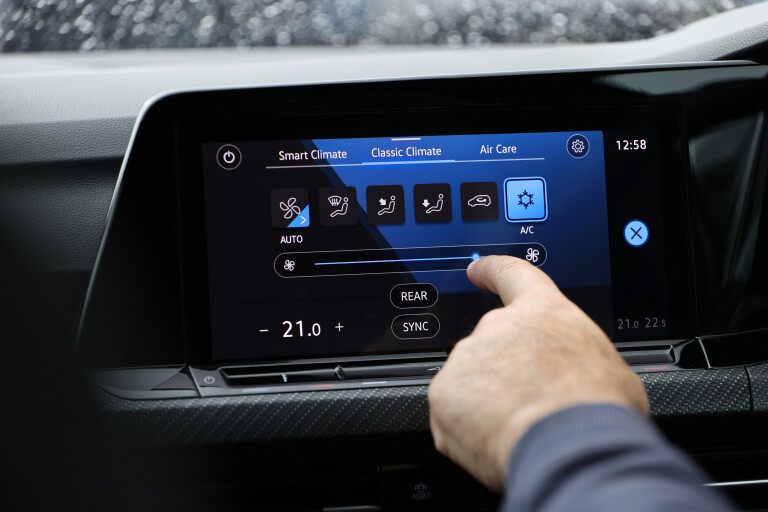
Selecting the Eco, Comfort, Sport and Individual driving modes is also done via the screen, which is a bit of a pain as well but at least there is a shortcut ‘button’ underneath the screen, so it’s only a two-touch operation.
The 10.25-inch digital driver display provides different functions and can be customised with different colours. It allows for different views including a navigation map and an active safety monitor that shows you vehicles in front and adjoining lanes as well as your adaptive cruise control settings.
The most obvious change is the lack of physical buttons and switches, almost everything is controlled on the screen including most of the tri-zone climate control functions.
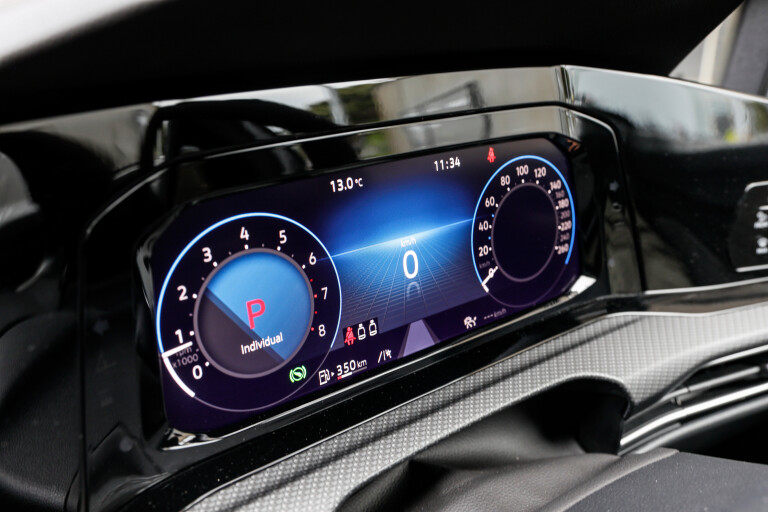
Despite being a new model, the Golf 8 is built on the same MQB chassis as its predecessor, meaning there is no difference when it comes to back seat space, which is about average for a hatchback.
Leg and headroom are okay, and rear-seat passengers will find air vents with dedicated temperature control, two extra USB-C ports, multi-pouch map pockets and a fold-down centre armrest with cup holders.
The luggage area is a handy 374 litres, or 800mm long with the rear seats up and 1003mm wide between the wheelarches.
You can adjust the boot floor to be level with the load lip or a little deeper to carry more stuff and below the floor is a space-saver spare wheel with associated tools.
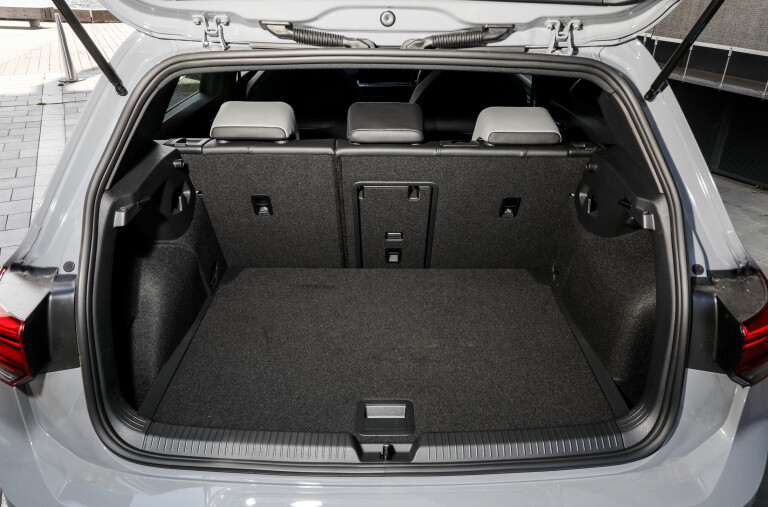
The 1.4-litre turbocharged petrol engine offers economical driving with an official combined fuel consumption rating of 5.8L/100km.
As well as being able to store longer items through the middle of the rear seat, the seatbacks fold down with a 60:40 split that provides up to 1493mm of load length behind the front seats, or up to 1293 litres.
The Volkswagen Golf is covered by a five-year, unlimited-kilometre warranty and has 12-month/15,000km service intervals. Each service at VW service centre costs $405 under the company’s Assured Service Pricing, or you can opt for three- or five-year ‘Care Plans’ for $1200 or $2100 respectively.
What is the Volkswagen Golf R-Line like to drive?
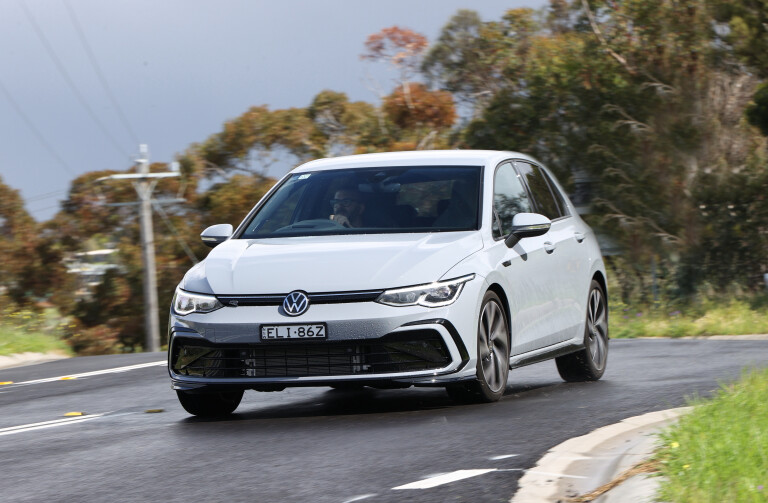
While it carries over the 110kW/250 Nm engine – otherwise known as 110TSI – from the Golf 7.5, the Golf 8’s powertrain differs with the inclusion of an eight-speed torque converter automatic gearbox in place of the veteran seven-speed dual-clutch auto.
This slightly affects performance, with the 0-100km/h time increasing from 8.2 to 8.5 seconds, and it’s not quite as quick through the gears as the DSG. However, it shifts seamlessly and you don’t get that low-speed hesitation when parking or stuck in traffic.
Despite its modest power output, this is quite a punchy engine with a strong mid-range that’s very useful for overtaking and negotiating hills – and it provides more than enough power to have a little fun.
It’s a fantastic engine with a manual gearbox, but sadly that’s only available in the entry-level variant that misses out on plenty of features found in this and the Life.
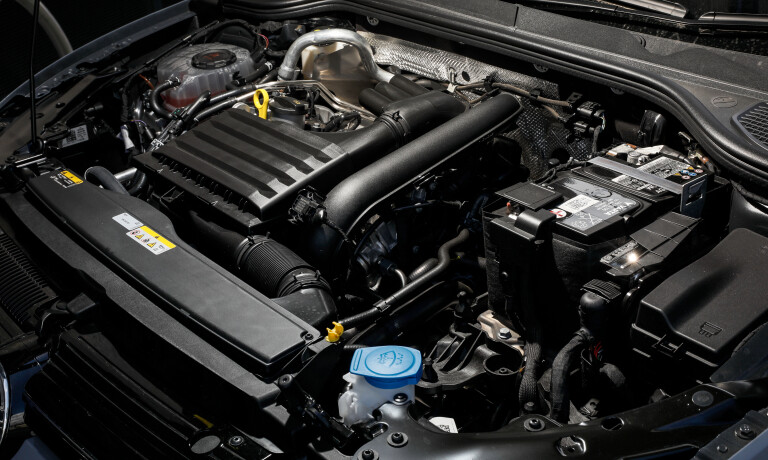
As well as the driving modes mentioned earlier, the R-Line also benefits from the 15mm-lower sports suspension and progressive steering that’s also found in the Golf GTi and R.
It’s plenty of fun to chuck around bends and roundabouts. You barely feel any body roll and the steering, which also tightens up in Sport mode, does exactly what you want it to.
Despite the stiffer suspension and 18-inch rims, the ride is generally comfortable and still absorbs bumps and inconsistencies across different road surfaces quite well.
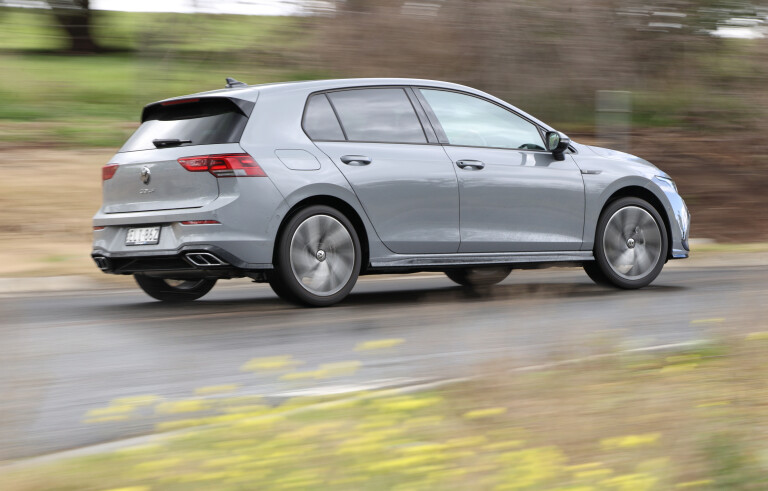
That said, the low-profile Bridgestone Turanza tyres make a tinny noise over certain surfaces, which cuts through to the cabin. Wind noise, on the other hand, is well tamed.
In short, while it lives in the shadow of the hot hatch Golfs, this R-Line still brings plenty of driver enjoyment for a fraction of the cost.
It’s plenty of fun to chuck around bends and roundabouts. You barely feel any body roll and the steering, which also tightens up in Sport mode, does exactly what you want it to.
What is the Golf R-Line like for safety?
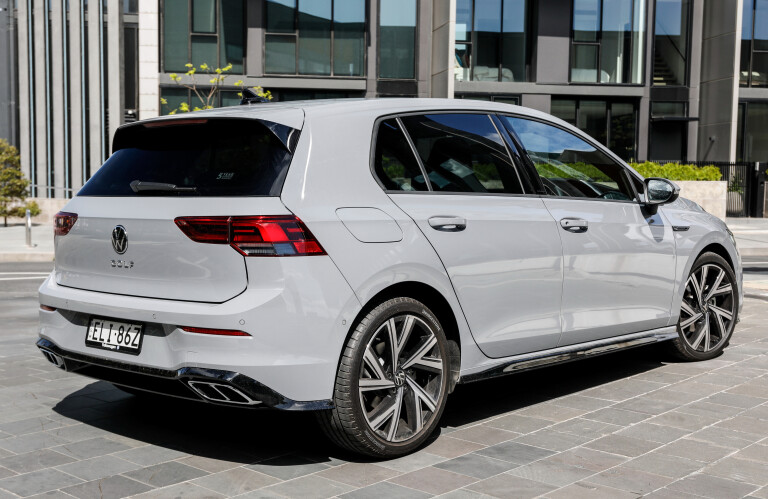
The Mark 8 Golf has a five-star ANCAP safety rating and each version is equipped with eight airbags including two frontal, two front-side, two rear-side, and front and rear curtains.
It also comes standard with Volkswagen IQ Drive technology that includes adaptive cruise control, lane-keep assist, rear-cross traffic alert and auto emergency braking that will also stop the car if you’re about to turn in front of an oncoming vehicle and includes both pedestrian and cyclist detection.
VERDICT
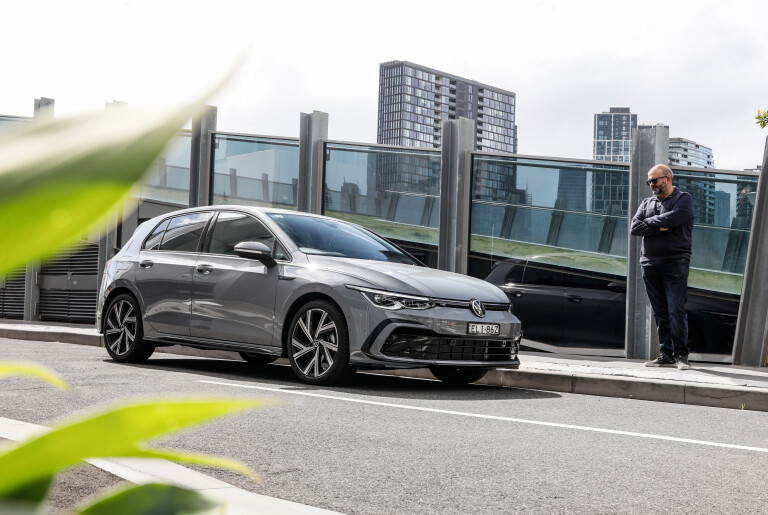
The Volkswagen Golf R-Line isn’t the sweet spot of the standard Golf range – that honour goes to the mid-spec Golf Life that shares the same performance and many of the features but is more than $3000 cheaper.
To me, where the well-equipped and nicely finished R-Line becomes a good value proposition is when you compare it to the premium hatchbacks costing several thousand dollars more, such as its Mercedes-Benz A200 and BMW 118i compatriots.
It is also an excellent and more affordable alternative to the similarly equipped and powered Audi A3 35 TFSI that isn’t yet available in Australia.
2021 Volkswagen Golf R-Line specifications
| Body | 5-door, 5-seat hatchback |
|---|---|
| Drive | Front-wheel |
| Engine | 1.4-litre, 4-cylinder, DOHC, 16v, turbo |
| Bore/Stroke | 74.5 x 80.0mm |
| Compression ratio | 10.5:1 |
| Power | 110kW @ 5000rpm |
| Torque | 250Nm @ 1500-4000rpm |
| Transmission | 8-speed automatic |
| 0-100km/h | 8.5sec (claimed) |
| Fuel consumption | 5.8/100km (combined/claimed) |
| Weight | 1247kg |
| Power/Weight | 77kW/tonne |
| Front suspension | struts, coil springs, anti-roll bar |
| Rear suspension | torsion beam, coil springs, anti-roll bar |
| L/W/h | 4284/1789/1456mm |
| Wheelbase | 2636mm |
| Boot volume | 374/1439L (rear seats up/down) |
| Steering | Progressive electrically assisted rack-and-pinion |
| Brakes | Ventilated discs (f); solid discs (r) |
| Wheels | 18 x 7.5-inch alloys |
| Tyres | 225/40 R18 Bridgestone Turanza |
| Price | $37,490 + ORC |
Score breakdown
Things we like
- Looks great
- Ride comfort and handling
- Smoother auto transmission
- Cabin fit, features and finish
Not so much
- Fiddly touchpad controls
- No R-Line six-speed manual option
- Tyre noise
- Questionable value over the Life

COMMENTS